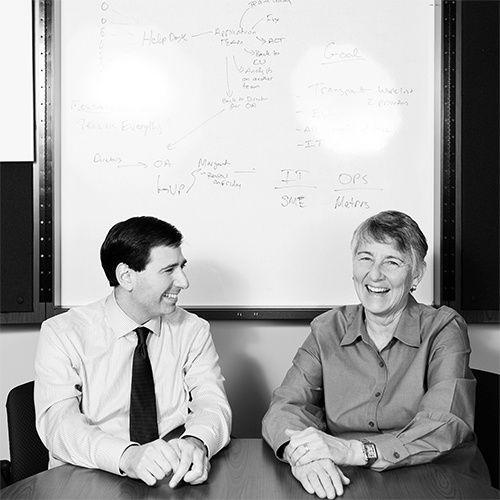Judy Brown is a numbers person, but she discovered a greater passion for healthcare at her first job with an accounting firm that specialized in the industry.
She eventually moved into hospital organizations in CFO roles, and then chief operating officer roles, but her goal to help improve their financial health to the point that it would improve their operations and patient care remained constant.
During this time, Brown’s father was admitted to a hospital following a medical procedure. The facility was six hours away from where Brown lived, and he required special care. He wasn’t able to place a call and order food, so Brown did it for him remotely. But when his meals were delivered, he couldn’t even pull the tray closer to his bed.
This experience of being limited in the ways she could help her father changed her perspective of healthcare. “We don’t necessarily think about these unfortunate realities that are sometimes part of healthcare,” Brown says. “But it’s important to remember that it’s every staff person’s job—not only nurses and doctors—to provide care for every patient.”
That patient-centered thinking permeates East Jefferson General Hospital, located in Metairie, Louisiana, where Brown was executive VP and chief operating officer from 2010 until her retirement this year. “It’s important to remember that every health need—physical, emotional, social, and spiritual—is highly personalized,” says Brown.
So, the team at East Jefferson is encouraged to bring the same level of individual engagement across that spectrum. All staff are taught to be patient advocates, and if they themselves are unqualified to provide care, they ensure someone else does. “That’s what makes each caregiver different and special, and what develops the organizational culture,” she says.
And the culture at East Jefferson bears mentioning. Collaborative and team-oriented, the staff shares responsibility and accountability in their work. Teammates support one another, functioning like the best version of a family. It’s a reputation that everyone has contributed to, and of which Brown is immensely proud—particularly in the moments when she mentors individuals early in their careers.
“That’s a legacy I’d like to leave,” she says. “One that will keep on giving as those I’ve mentored mentor the next generation.”
For Brown, self-motivation, accountability, and creative flexibility are imperative in her leadership. Creating the environment in which to cultivate those characteristics at East Jefferson has been based on trust.
“Talking with your team and making sure you’re on the right track yourself is part of being a good leader in a collaborative culture,” she says. “You have to be comfortable with others challenging you, and you have to make sure that they’re comfortable with you challenging them.” This philosophy is at the core of accountability, a crucial practice for Brown that goes back to her finance background.
But in finance, flexibility is as important as accountability. When a planning budget doesn’t quite balance, accountants think creatively about moving funds from one line item to cover shortfalls in another. This kind of thinking was ingrained in Brown at the beginning of her career and served her well in a variety of contexts to the very end. “Learning to see how you might change responsibilities or operations in a way that will enable you to flex somewhere else allows you to manage and meet expectations,” Brown says. “You can’t control everything, but you can take steps to mitigate what you can’t change.”
Here’s another applicable finance mindset: while you can’t plan for something you don’t expect, you can develop strategic contingency plans—especially in the ever-changing healthcare industry. Brown has relied on gap-analysis reports of all kinds to make decisions, using them to identify opportunities, mitigate downsides with upsides, and ask what can be done to prevent wasted capital. Exit strategies and recovery plans are important, too, as is keeping information in front of leadership to ensure that the team can see the whole picture as they make decisions together.
Even as she holds her team accountable to their work, Brown takes her responsibility to her team very seriously. “I have to stay in touch to know what’s going on so I can either coach them or remove them,” she says. “Leaders shouldn’t pass responsibility down the line. It’s my responsibility to make sure they are accountable. The buck stops with me.”
East Jefferson functions like a family, but flesh and blood is where the conversation about healthcare hits home. Brown’s older brother, whom she describes as her hero, taught her many valuable lessons, right up until he passed away from ALS in 2015.
As he lost his ability to care for himself, Brown and her family developed an ability to anticipate his needs based on things as subtle as eye movement. Near the end of his hospital stay, the hospital staff was equally attentive. Brown experienced firsthand the criticality to each and every hospital employee paying attention, listening, and remembering that it’s the little things that affect a patient’s and their family’s experience.
That kind of individualized attention is the heart of all-around patient-centered care—the kind of care that Brown has passionately provided throughout her career, and that remains the precedent for the patient experience at East Jefferson. AHL


